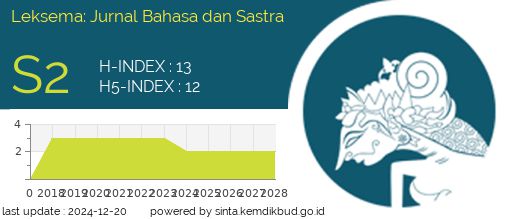STUDENTS’ PROBLEMS ON S-V AGREEMENT IN TOEFL AND THEIR PROPOSED SOLUTIONS
DOI:
https://doi.org/10.22515/ljbs.v3i2.1409Keywords:
solutions, students' problems, subject-verb agreement, TOEFLAbstract
This article is presented to discover the students’ problems in subject-verb (S-V) agreement and provides pedagogical solutions to these problems. This study employed descriptive design. There were two instruments used to collect data. The first instrument was a test. It consisted of 10 items with two different types of questions. The second instrument was an open-ended questionnaire consisting of two questions. The participants were 25 social science students of a private university in Yogyakarta. The data included in this study were 10 students’ works which were randomly selected. The result shows that the students' problems in S-V agreement came from their misunderstanding on: future continuous tense, singular-plural subject, appositive, the use of present participle as adjective, the use of simple present tense, the use of either … or … to show one subject, the presence of double subjects, and the use of both to show double subjects. To encounter these problems, the teacher is suggested to teach the students about the essential elements of a sentence first rather than teaching other aspects. The essential elements are subject and predicate. In short, the students must understand well that a sentence, at least, must consist of one subject and one predicate (verb). After understanding the essential elements of a sentence, the students can be taught to understand other supporting aspects which also become the causes of students’ problems in S-V agreement.
Downloads
References
Abboud, ZAR & NJ Hussein. 2011. “The Difficulties Faced by Advanced Iraqi Foreign Learners in Passing ITP TOEFL Testâ€. Journal of Basrah Researches (Humanities Series), 36 (4): 110-138
Ahangari, S & AH Barghi, 2012. “Consistency of Measured Accuracy in Grammar Knowledge Tests and Writing: TOEFL PBTâ€. Language Testing in Asia, 2 (2): 5-21
Ananda, R. 2016. “Problems with Section two ITP TOEFL Testâ€. Studies in English Language and Education, 3 (1): 35-49
Antoni, R., 2014. “An Analysis on 6th Semester Students’ TOEFL Experience at English Department of Teachers Training and Education Faculty of Pasir Pengaraian Universityâ€. Jurnal Ilmiah Edu Research, 3 (1): 9-16.
Atmojo, AEP. 2013. The English Block of Words as an Innovative Material in Teaching English Grammar. Selangor: IIUM Press of International Islamic University Malaysia.
Hajri, T, Jufrizal & D. Wahyuni, , 2018. “An Analysis of Difficulties in Answering Structure and Written Expression of TOEFL Made by English Students of Universitas Negeri Padangâ€. Journal of English Language Teaching. 7 (1): 93-105
Ismail, NM & S. Wahyuni. 2017. “Peer-Discussion in TOEFL Preparation Classâ€. Indonesian Journal of English Education, 4(1): 63-70
Mahmud, M. 2014. “The EFL Students’ Problems in Answering the Test of English as a Foreign language (TOEFL): A Study in Indonesian Contextâ€. Theory and Practice in Language Studies, 4 (12): 2581-2587.
Mufidah, N., 2014. “The English Teachers’ Mastery in TOEFL Prediction. Journal on English as a Foreign Language, 4 (2): 79-86
Nurhayati, N & Nehe, BM. 2016. “An Analysis of Students’ Strategies in Answering TOEFLâ€. The Journal of English Language Studies, 1(1): 10-18.
Tanihardjo, J. 2016. “The Analysis of Students‘ English Competence in the Grammar Section in the Paper-based TOEFL: A Case Study at English Department in Bunda Mulia Universityâ€. Journal of English Language and Culture, 6 (1): 19-30
Downloads
Published
Issue
Section
License
The copyright of the received article shall be assigned to the publisher of the journal. The intended copyright includes the right to publish the article in various forms (including reprints). The journal maintains the publishing rights to published articles.
In line with the license, the authors and users (readers or other researchers) are allowed to share and adapt the material only for non-commercial purposes. In addition, the material must be given appropriate credit, provided with a link to the license, and indicated if changes were made. If authors remix, transform or build upon the material, authors must distribute their contributions under the same license as the original.






